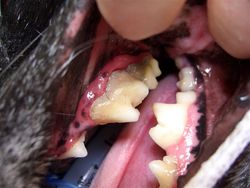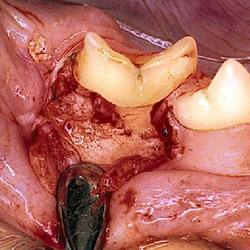 Bacteria living in the plaque underneath the gumline produce toxins which cause tissue inflammation, and eventually lead to destruction of the structures supporting the tooth. Gingivitis is inflammation of the gums, and can be seen as a line of red, swollen tissue along the gum margin.
Bacteria living in the plaque underneath the gumline produce toxins which cause tissue inflammation, and eventually lead to destruction of the structures supporting the tooth. Gingivitis is inflammation of the gums, and can be seen as a line of red, swollen tissue along the gum margin.
The periodontal ligament is a band of tough fibrous tissue extending around the root of the tooth that attaches the tooth to the underlying bone. As bacteria continue to cause inflammation, this ligament becomes damaged, and deep pockets begin to form around the roots of the teeth. These pockets can harbour even more plaque and bacteria, leading to a vicious cycle of destruction.
Eventually, bone loss begins to occur around the root of the tooth, leading to root exposure, tooth mobility and tooth loss. Once periodontal disease begins, it is irreversible. Constant management through regular dental cleanings and daily homecare is essential to prevent the progression of this painful disease.
 Bacteria living underneath the gumline can also easily travel through the inflammed gingival tissues into the patient’s bloodstream. These bacteria can then lead to infection and disease in other organs of the body, such as the heart, kidneys and liver.
Bacteria living underneath the gumline can also easily travel through the inflammed gingival tissues into the patient’s bloodstream. These bacteria can then lead to infection and disease in other organs of the body, such as the heart, kidneys and liver.
If your dog or cat has periodontal disease, we may need to perform advanced periodontal treatment or surgery. If deep pockets (more than 5 mm) exist under the gumline, then it is impossible to adequately clean the roots of the tooth unless a surgical flap is created and the root is exposed for easier cleaning. An example of such a flap can be seen in the adjacent photo.
Antibiotic gels are often infused into these deep pockets to help eliminate infection and reduce inflammation. These gels last for up to several weeks, and help the gingiva (gums) re-attach to the newly cleaned tooth roots.
If bone loss has occurred, bone grafting materials may be used to encourage new bone growth around the roots of the teeth. If bone loss is extensive, then extraction of the tooth may be the only possible option.
When deciding whether or not to extract a tooth or perform periodontal surgery, it is very important to consider whether or not you can maintain good follow-up home care (daily brushing). Without good home care, these teeth will quickly deteriorate, and once again become infected and painful. For owners who cannot brush their pet’s teeth regularly, extraction is often the best and most humane option for eliminating this problem.
